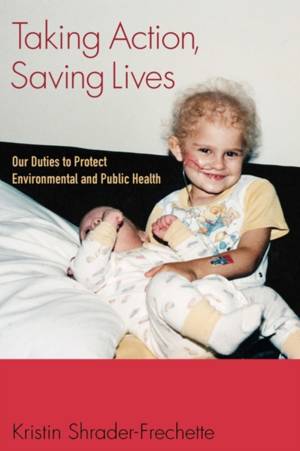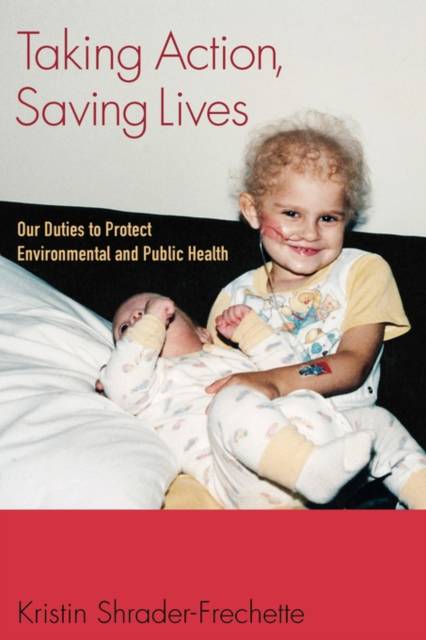
Je cadeautjes zeker op tijd in huis hebben voor de feestdagen? Kom langs in onze winkels en vind het perfecte geschenk!
- Afhalen na 1 uur in een winkel met voorraad
- Gratis thuislevering in België vanaf € 30
- Ruim aanbod met 7 miljoen producten
Je cadeautjes zeker op tijd in huis hebben voor de feestdagen? Kom langs in onze winkels en vind het perfecte geschenk!
- Afhalen na 1 uur in een winkel met voorraad
- Gratis thuislevering in België vanaf € 30
- Ruim aanbod met 7 miljoen producten
Zoeken
Taking Action, Saving Lives
Our Duties to Protect Environmental and Public Health
Kristin Shrader-Frechette, K S Shrader-Frechette
€ 54,95
+ 109 punten
Uitvoering
Omschrijving
In the United States alone, industrial and agricultural toxins account for about 60,000 avoidable cancer deaths annually. Pollution-related health costs to Americans are similarly staggering: $13 billion a year from asthma, $351 billion from cardiovascular disease, and $240 billion from occupational disease and injury. Most troubling, children, the poor, and minorities bear the brunt of these health tragedies.
Why, asks Kristin Shrader-Frechette, has the government failed to protect us, and what can we do about it? In this book, at once brilliant and accessible, Shrader-Frechette reveals how politicians, campaign contributors, and lobbyists--and their power over media, advertising, and public relations--have conspired to cover up environmental disease and death. She also shows how science and regulators themselves are frequently "captured" by well-funded polluters and special interests. But most important, the author puts both the blame--and the solution--on the shoulders of ordinary citizens. She argues that everyone, especially in a democracy, has a duty to help prevent avoidable environmental deaths, to remain informed about, and involved in, public-health and environmental decision-making. Toward this end, she outlines specific, concrete ways in which people can contribute to life-saving reforms, many of them building on recommendations of the American Public Health Association.
As disturbing as it is, Shrader-Frechette's message is ultimately hopeful. Calling for a new "democratic revolution," she reminds us that while only a fraction of the early colonists supported the American Revolution, that tiny group managed to change the world. Her book embodies the conviction that we can do the same for environmental health, particularly if citizens become the change they seek. "Influential and impressive. " - Nicholas A. Ashford, Massachusetts Institute of Technology
"Important and compelling, clearly written, accessible. I enthusiastically recommend this book." - James F. Childress, University of Virginia
"This book shakes the reader." - Avner de-Shalit, Hebrew University of Jerusalem
"Powerful, perspicuous, convincing. Essential reading for today." - Inmaculada de Melo-Martin
"A must-read - a book you won't want to put down." - Kevin Elliott, University of South Carolina
"An eloquent and persuasive plea to scientists and citizens." - George W. Fisher, Johns Hopkins University
"Engaging, compelling - deserves to be read by nearly everyone." - William R. Freudenberg, University of California, Santa Barbara
"By one of America's foremost philosophers and public intellectuals; immensely readable, courageous, often startling, insightful." - Richard Hiskes, University of Connecticut
"Timely, accessible, and written with enviable clarity and passion. A distinguished philosopher sounds an ethical call to arms to prevent illness and death from pollution." - Sheila Jasanoff, Harvard University
"A blistering account of how advocacy must be brought to bear on issues of justice and public health." - Jeffrey Kahn, University of Minnesota
"Breaks new ground in linking environmental protection with social justice. A brilliant inquiry." - Sheldon Krimsky, Tufts University
"Powerful, lucid, disturbing, poignantly hopeful, lively; deserves to be widely read." - Hugh Lacey, Swarthmore College
"A powerful call to action that needs to be heard by consumers and policymakers alike." - Anna C. Mastroianni, University of Washington
"No other author can so forcefully bring together ethical analysis, government policy, and environmental science. Outstanding." - Colleen Moore, University of Wisconsin
"Accessible, thoughtful, exceptional. It made me want to go out and slay a few dragons of my own!" - Felicity Sackville Northcott, Johns Hopkins University
"Convincing, with an impressive command of scientific knowledge. No book more clearly demonstrates the need for citizen action." - Mark Sagoff, University of Maryland
"Like Rachel Carson's Silent Spring - brilliant, brave." - Sylvia Hood Washington, University of Illinois, Chicago
"This book is inspirational as much as it is scientific....Highly recommended." -- CHOICE
Why, asks Kristin Shrader-Frechette, has the government failed to protect us, and what can we do about it? In this book, at once brilliant and accessible, Shrader-Frechette reveals how politicians, campaign contributors, and lobbyists--and their power over media, advertising, and public relations--have conspired to cover up environmental disease and death. She also shows how science and regulators themselves are frequently "captured" by well-funded polluters and special interests. But most important, the author puts both the blame--and the solution--on the shoulders of ordinary citizens. She argues that everyone, especially in a democracy, has a duty to help prevent avoidable environmental deaths, to remain informed about, and involved in, public-health and environmental decision-making. Toward this end, she outlines specific, concrete ways in which people can contribute to life-saving reforms, many of them building on recommendations of the American Public Health Association.
As disturbing as it is, Shrader-Frechette's message is ultimately hopeful. Calling for a new "democratic revolution," she reminds us that while only a fraction of the early colonists supported the American Revolution, that tiny group managed to change the world. Her book embodies the conviction that we can do the same for environmental health, particularly if citizens become the change they seek. "Influential and impressive. " - Nicholas A. Ashford, Massachusetts Institute of Technology
"Important and compelling, clearly written, accessible. I enthusiastically recommend this book." - James F. Childress, University of Virginia
"This book shakes the reader." - Avner de-Shalit, Hebrew University of Jerusalem
"Powerful, perspicuous, convincing. Essential reading for today." - Inmaculada de Melo-Martin
"A must-read - a book you won't want to put down." - Kevin Elliott, University of South Carolina
"An eloquent and persuasive plea to scientists and citizens." - George W. Fisher, Johns Hopkins University
"Engaging, compelling - deserves to be read by nearly everyone." - William R. Freudenberg, University of California, Santa Barbara
"By one of America's foremost philosophers and public intellectuals; immensely readable, courageous, often startling, insightful." - Richard Hiskes, University of Connecticut
"Timely, accessible, and written with enviable clarity and passion. A distinguished philosopher sounds an ethical call to arms to prevent illness and death from pollution." - Sheila Jasanoff, Harvard University
"A blistering account of how advocacy must be brought to bear on issues of justice and public health." - Jeffrey Kahn, University of Minnesota
"Breaks new ground in linking environmental protection with social justice. A brilliant inquiry." - Sheldon Krimsky, Tufts University
"Powerful, lucid, disturbing, poignantly hopeful, lively; deserves to be widely read." - Hugh Lacey, Swarthmore College
"A powerful call to action that needs to be heard by consumers and policymakers alike." - Anna C. Mastroianni, University of Washington
"No other author can so forcefully bring together ethical analysis, government policy, and environmental science. Outstanding." - Colleen Moore, University of Wisconsin
"Accessible, thoughtful, exceptional. It made me want to go out and slay a few dragons of my own!" - Felicity Sackville Northcott, Johns Hopkins University
"Convincing, with an impressive command of scientific knowledge. No book more clearly demonstrates the need for citizen action." - Mark Sagoff, University of Maryland
"Like Rachel Carson's Silent Spring - brilliant, brave." - Sylvia Hood Washington, University of Illinois, Chicago
"This book is inspirational as much as it is scientific....Highly recommended." -- CHOICE
Specificaties
Betrokkenen
- Auteur(s):
- Uitgeverij:
Inhoud
- Aantal bladzijden:
- 314
- Taal:
- Engels
- Reeks:
Eigenschappen
- Productcode (EAN):
- 9780199767243
- Verschijningsdatum:
- 15/04/2011
- Uitvoering:
- Paperback
- Formaat:
- Trade paperback (VS)
- Afmetingen:
- 156 mm x 234 mm
- Gewicht:
- 439 g

Alleen bij Standaard Boekhandel
+ 109 punten op je klantenkaart van Standaard Boekhandel
Beoordelingen
We publiceren alleen reviews die voldoen aan de voorwaarden voor reviews. Bekijk onze voorwaarden voor reviews.









